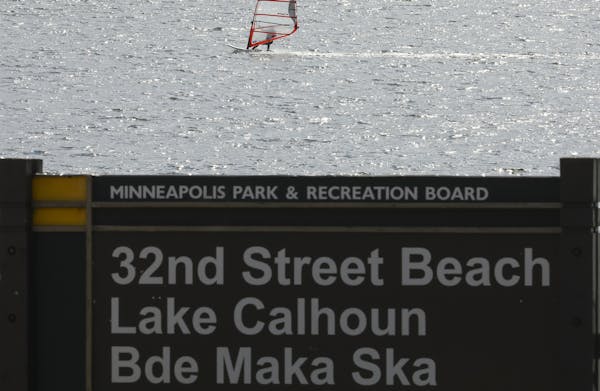A group of Minneapolis residents filed legal action this week to prevent changing the name of Lake Calhoun to its original Dakota name of Bde Maka Ska.
At the same time, legislators from Minneapolis issued a letter urging the state Department of Natural Resources (DNR) commissioner to ratify the new name in order to enhance local understanding of American Indian history.
In November, the Hennepin County Board voted to make the name change, which now must go to the DNR for approval before federal officials get the final say.
The group opposing the name change, called Save Lake Calhoun, sent a "cease and desist" letter Tuesday to DNR Commissioner Tom Landwehr that alleged several statutory violations by the County Board.
Erick Kaardal, attorney for Save Lake Calhoun, said the board didn't have the authority to recommend a change if the lake name in question had been used for more than 40 years — as is the case with Lake Calhoun.
Moreover, Kaardal said, the fact that the Minneapolis Park and Recreation Board has already added Bde Maka Ska to signs around the lake eliminates the need to change Lake Calhoun as the official name.
He added that in approving the name change, the County Board gave no factual basis for the change or any rationale as to why it would be in anyone's best interest.
"Members of Save Lake Calhoun raised these issues with the County Board, and they set them aside," Kaardal said. "A representative from the DNR was at the meeting when the name was approved, and said the board was in compliance with state law. We are calling out this sham."
Indians who once lived along the lake called it Bde Maka Ska, but federal surveyors in the early 1800s renamed it for U.S. Secretary of War John Calhoun, who had sent them to the area to prepare for Fort Snelling's construction.
Calhoun, who went on to become vice president and a U.S. senator from South Carolina, was an outspoken supporter of slavery.
"The name change represents a significant acknowledgment of our history as a city, county and state," the legislators said in their joint letter, issued Wednesday.
"Restoring the name Bde Maka Ska will start conversations and educational experiences about our history and the first indigenous people of Minnesota. This action will grow a deeper appreciation for the vibrant Native American Indian communities that still exist in Minneapolis and throughout the state."
State officials said this was the first time that a proposed lake name change has faced significant public pushback.
Save Lake Calhoun, which claims the backing of several thousand residents, has been an active and vocal opponent of the name change for months. It has placed several half-page ads in the Star Tribune that talk about how Lake Calhoun was named and calling out County Board members who voted to change it.
"Lake Calhoun is the first victim of what will be a tsunami of extremist name-change advocacy," the ad stated.
Tom Austin, leader of Save Lake Calhoun, said he spoke with virtually every homeowner in the area near the lake in southwest Minneapolis. Eighty percent were opposed to the name change for various reasons, he said.
"They were overwhelmingly disgusted that public officials were spending all of this time and energy on the lake renaming issue when there are so many other pressing problems facing the community that need to be addressed," he said.
Carolyn Marinan, a spokeswoman for Hennepin County, said in an e-mail that the county "complied with its statutory obligations" and that the authority to rename the lake now "lies with the Commissioner of the DNR."
If Landwehr approves changing the lake's name to Bde Maka Ska, the U.S. Board of Geographic Names would have to accept it. Before that happens, Kaardal said, Save Lake Calhoun would challenge the commissioner's decision with a petition to the Minnesota Court of Appeals.
"We know the court is really receptive to hearing cases on the limitations of state officials set by law," he said.
David Chanen • 612-673-4465

Want to share info with the Star Tribune? How to do it securely

'Safe recovery sites' would offer syringes, naloxone and more to people using drugs. The plan could be in peril.
New Minnesota GOP leaders seek peace with party's anti-establishment wing

Who is Republican Lisa Demuth, Minnesota's first House speaker of color?

